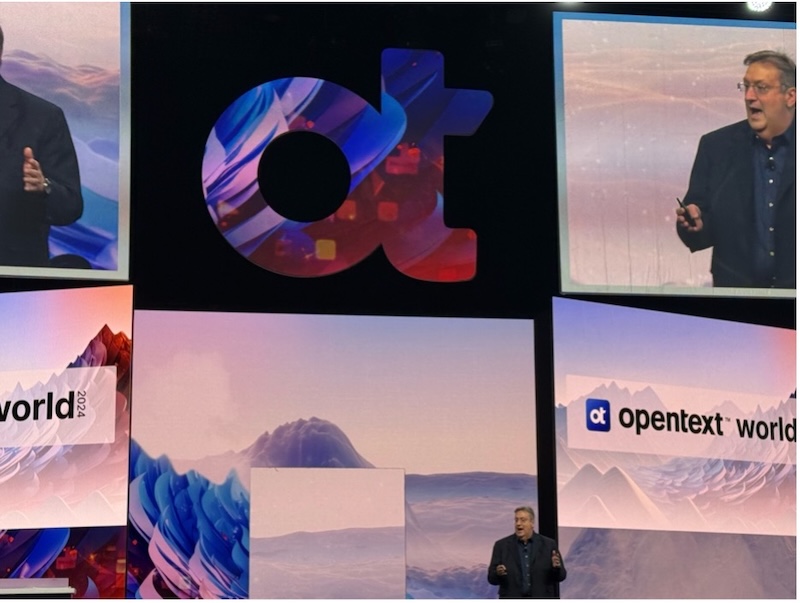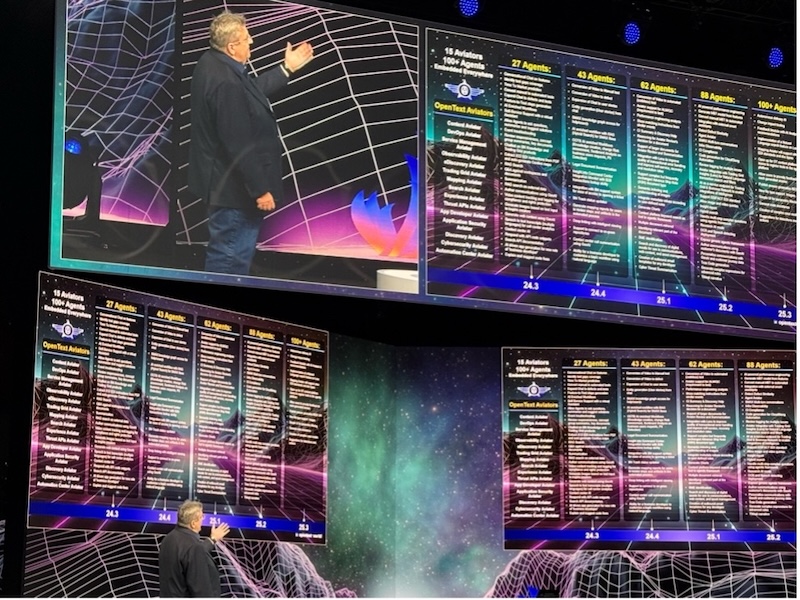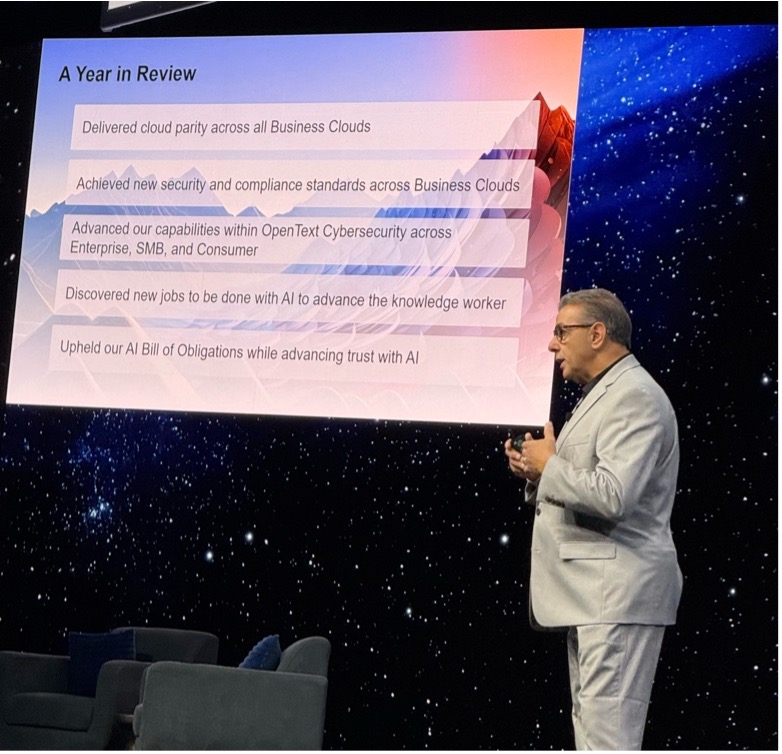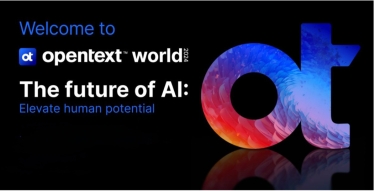Yes, OpenText has AI—and I’m totally here for it.
Under the banner “Information Reimagined: Elevate Human Potential,” the conference convened thousands of thought leaders, innovators, and change-makers to delve into cutting-edge advancements in multi-cloud systems, business AI, and transformative technologies. It was a gathering that not only showcased the future but also equipped business owners like myself with the tools to shape it.
Meet OpenText: the information company
For those unfamiliar, OpenText is a global leader in Information Management software and services. Founded in 1991 and headquartered in Waterloo, Canada, the company has grown exponentially, helping organisations tackle complex global challenges. With over 120,000 enterprise customers and 210,000 small to medium-sized businesses across more than 180 countries—including 98 of the top 100 largest companies in the world—they’ve seen it all.
|
|
OpenText plays a pivotal role in enabling businesses to securely manage and glean insights from their enterprise information. Their clientele includes giants like Vodafone, Sprint, Hyatt, Chevron, and the Government of Canada. This year alone, they’ve added Alaska Airlines, Bombardier, and Dick’s Sporting Goods to their roster, contributing to total revenues of $1.27 billion for the first quarter ending 30 September 2024.
Their achievements are monumental. OpenText has consistently been at the forefront of innovation, acquiring significant enterprises to expand its capabilities—most notably the acquisition of Micro Focus in 2023, which bolstered its offerings in cybersecurity, application delivery, and IT operations. Industry analysts have recognised OpenText as a leader in multiple categories, including Content Services Platforms and Enterprise Information Archiving.
Constantly innovating, their 3,400+ patents are a testament to that commitment. At OpenText World 2024, they gave us a glimpse into the future of data and information management.
The visionary keynote
OpenText CEO and CTO Mark J. Barrenechea kicked off the event with a visionary keynote that resonated deeply. He emphasised that information is at the centre of human potential and that organisations possess two proprietary gifts: talent and data. With the introduction of Titanium X, AI is set to transform the value of both. Coming from a company that has been developing and patenting AI techniques since 1996, I knew my AI appetite would be well satisfied. As Mark aptly put it, talent and data are about to be given superpowers with Titanium X.

Image: OpenText CEO and CTO Mark J. Barrenechea
Introducing Titanium X
One of the most exciting announcements was the readiness of Titanium X. This advancement showcases OpenText’s commitment to practical solutions, from enhanced multi-cloud integrations to AI agents that unlock human potential. The integration of 15 Aviators and over 100 AI agents promises to boost productivity through autonomous workflows, summarisation, and ingenious prompting—a concept that aligns perfectly with my belief in AI’s capacity to augment human capabilities and add tremendous value to workflows and productivity.
Being inundated with data myself, I’ve often thought, “I have all this data, but what can I do with it?” Titanium X and OpenText’s AI agents share a love for data too. The showcase demonstrated the potential for agentic behaviour, with agents able to take the repetitive or mundane and streamline it. They illustrated how leveraging your data can yield real insights and significant productivity and efficiency gains for your workforce. Mark said it best that the two gifts to any company is data and talent. Simple, yet effective.
Currently, Titanium X has about 70 agents, with two final releases scheduled over the coming months. By April 2025, Titanium X will feature all 100 agents. With this release, OpenText is committing to 90-day feature releases throughout the year to continually propel their products forward through 2025.

Image: The cumulative growth of AI agents inside OpenText
But it doesn’t stop there. OpenText’s suite—including Content Aviator, Information Archive, DevOps Aviator, and Software Delivery Platform—is centred around business AI solutions that leverage generative AI to help businesses maximise the value of their intellectual property.
- Content Aviator and Information Archive: These tools empower data managers within IT to retrieve insights and archived content from legacy systems using intelligent large language model chat interfaces. With natural language queries, users can access, summarise, and reference archived content at lightning speed.
- DevOps Aviator: This innovation uses AI and large language models to eliminate the need for coding by automating the conversion of video recordings into manual tests and defect reproduction systems. Imagine recording your screen while testing a product, identifying a bug, and then turning that into brand-new code aimed at fixing the issue quicker. This will greatly accelerate project timelines.
- Software Delivery Platform: Built to streamline workflows and reduce the risk of errors on projects, this platform is shaping the future of how businesses handle, communicate, and leverage their systems and data.
Making multi-cloud work seamlessly
A key takeaway from the conference was the emphasis on making multi-cloud environments work seamlessly. OpenText enhances the power of an ecosystem of applications, infrastructure, supply chain, and security solutions, allowing customers to benefit from an integrated experience without the need to move their data. Major companies and providers often have unique setups that aren’t the best at communicating with each other. OpenText aims to bridge that gap, all within a major commitment to an AI Bill of Rights:
- Your data is not our product
- Respect for your IP
- Dedicated, accurate, verifiable AI results
- Promote the common good
As someone who has navigated the complexities of data management over the past two decades, this approach represents a significant leap forward. Data entrenched in varying silos, lacking annotations or tagging, or simply being “dirty data,” makes the design and implementation of AI solutions tremendously cumbersome.
OpenText aims to achieve data resilience by bringing all these islands of expertise into a unified front.

AI as a catalyst for human potential
What truly inspired me was the focus on AI not just as a tool but as a catalyst for elevating human potential. The integration of AI agents across cloud and on-premises environments signifies a move towards more intelligent, autonomous systems that can handle routine tasks, freeing us to focus on innovation and creativity. This principle, is taking those two gifts of data and talent and using them to their utmost potential.
iTWire had the pleasure of sitting down with Lars Rossen, SVP and Chief Architect, to discuss the architecture and decisions around their AI roadmap. Refreshingly, their decision is to be LLM, RAG, and AI agnostic. Focused more on results and end-use cases, they apply what’s best—and in some instances, that’s not even AI but one of their existing methods or algorithms they’ve been building for decades (remember that 3400+ patents!). Discussions with providers like Claude, Gemini, Llama, and even OpenAI are all underway to ensure they are using the right AI for the right use case. On top of that, they are developing their own Small Language Models, which could be seen in future products.
“There isn’t a strong industry standard,” Lars commented when asked about the rapidly changing environment. He noted that developer kits are not common across the AI landscape, so they took that in-house. “We will drink our own champagne,” Lars explained—a great analogy, indicating that OpenText rolls out features internally across their 10,000 developers before releasing them to the market to ensure they meet their own high standards. With that level of workforce, they are committed to pushing boundaries quickly and safely. CEO Mark continually emphasised that security should not be down the list at the data centre level but should be priority number one—a solid statement and, in today’s environment, essential.
Data privacy and sovereignty are hot topics in any conversation about AI. Lars advocated for OpenText’s stance that the data belongs to the clients, and they have control over it. None of their AI is trained on customer data, and agreements with models used reflect that. A “Bring Your Own Model” (BYOM) option is available for users who wish to integrate proprietary or business-only models with their datasets, and OpenText welcomes discussions about professional service integration options for those that have their own model and want to integrate it.
Another important point Lars made was that models are constantly evolving and changing, requiring reworks on prompt engineering, as an example. OpenText is advising model partners to reduce the chance of releases without the ability to test or implement version controls, ensuring full retesting can be conducted before clients see the next version—critical to ensuring things work as they should.
Innovation continues
Day Two of OpenText World continued to build on the innovation momentum, with EVP and Chief Product Officer Muhi S. Majzoub highlighting OpenText’s newest innovations across industries such as retail, automotive, and manufacturing. Muhi showcased several clients and how data—and the sheer volume of it—is being transformed and turned into insights by AI. EVP and Chief Digital Officer Shannon Bell provided an insider’s perspective on how OpenText leverages its own technology to drive innovation internally. Their insights underscored the transformative impact of AI and the importance of staying ahead in the rapidly evolving digital landscape. OpenText uses OpenText. If it’s good enough for their 10,000 developers, it’s good enough for the world.

Image: Muhi S. Majzoub EVP and Chief Product Officer
Prior to the conference I read the 16th edition of the World Quality Report titled “New Features in Focus,” released for 2024-2025, in which OpenText is a technology partner, where they delved into how 68% of organisations are either actively using Gen AI or have developed roadmaps following successful pilot implementations.
Shannon Bell, EVP Chief Digital Officer, went on to explain how the company is invested in reducing their spend by $1 billion over the next 10 years, and their requirements on AI and the nature-positive imprint they want to leave on the world are part of that planned strategy. The costs of running AI and delivering it to the world are undeniable, and companies like OpenText that are aiming to achieve this reduction can only be a good thing to plan for.
Looking ahead: A secure and exciting future
As I reflect on the event, I’m invigorated by the possibilities that lie ahead. OpenText is not just pushing technological boundaries; it’s redefining how we think about information and its role in elevating human potential. The advancements in AI and technology showcased at OpenText World 2024 are paving the way for a future where human talent and data converge to create unprecedented opportunities. Agents and agentic behaviour represent an exciting frontier. It isn’t just about analysing a couple of documents, or hundreds of lines of code. OpenText can handle thousands and thousands of documents. It can handle hundreds of millions lines of code, if not more. I guess your task is to try and find their limit!
OpenText has a 25,000-strong workforce dedicated to developing solutions that better serve their users, with AI at the forefront of that development. It’s going to be an exciting 12 months before the next OpenText World. In fact, over the next two years, CEO Mark Barrenechea has two main goals: masking all data (all 5 exabytes worth!) and removing all passwords across the company, moving towards biometrics only. These features, along with the next wave of AI agents, mean that if successful, the future is both secure and thrilling.
iTWire was also able to sit down with a 1:1 discussion around security with Scott Richards, SVP Software Engineering, AI & Discovery/Cybersecurity. When asked about 2025 and what that entails, Scott advised that being able to “leverage AI to access data in ways that you have never been able to before” was OpenText’s priority. He added that asking questions of data and getting instant answers—all while having user and version controls and proper access in place—is critical. There are too many threat actors out there and not enough good humans. Millions and billions of security events happening daily require AI to take the smartest security person, duplicate them, and run them at scale, 24/7 – no need for a coffee break. That is what OpenText is looking to achieve with its security products, ensuring your data—one of your most valuable assets—remains yours so you can use it effectively to grow your business and invest in that talent.
Pressure is a privilege
When you see AI in action—not just theory—it’s hard not to be excited. The efficiency gains, the productivity boosts, and the empowerment of users to focus on what truly matters are inspiring, but it can also be overwhelming. Venus Williams—superstar Wimbledon and Olympic tennis player and now an AI entrepreneur with her new interior design business—was a special guest at the event, and she probably said it best: “Pressure is a privilege. If you are under it, you are probably doing something right.”
The pressures of AI for business owners grappling with how to adopt it are intense now. Business owners need to wrestle with how to implement it, who can implement it, and where to implement it. What even is it? Where do I start? How do I pay for this? Pressurising, isn’t it? It’s probably because it’s the right thing to do; it’s just a very fast-moving machine that OpenText is ready to help with.
For fellow enthusiasts and professionals in AI and technology, and for business owners, I encourage you to embrace these innovations so we can continue to reimagine information and elevate human potential together.
Embracing the future
OpenText World 2024 was more than a conference; it was an immersive experience that empowered professionals across roles to redefine how they interact with and utilise information. Through impactful keynotes, interactive workshops, and hands-on labs, attendees were equipped to drive meaningful change in their organisations.
As OpenText continues to advance the potential of information management, enabling professionals to redefine what’s possible for themselves and their businesses, one thing is clear: the future is secure, integrated, and powered by AI. And with OpenText leading the charge, we’re all strapped to that AI rocket, ready for an incredible journey ahead.








































